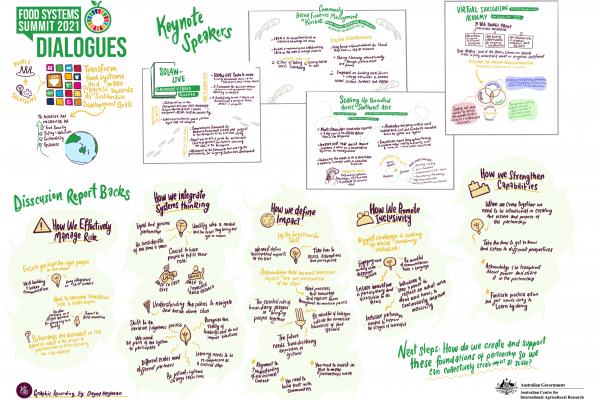Effectively managing risk
Innovation – the process of applying knowledge or technology to complex challenges in new ways – is inherently risky. Sometimes the perception of risk can be high enough to inhibit progress towards novel solutions. Partnerships are instrumental in all stages of innovation, as they can help to identify and distribute the associated risk burdens.
Partnerships must activity consider how they will effectively manage risk. Bringing together diverse actors and planning appropriately for future resourcing of projects, partnerships can more effectively manage risk and support the scaling of innovative solutions.
In an Australian–African collaboration, ACIAR funding contributed to the development of the Virtual Irrigation Academy, which brings together new irrigation monitoring tools with an online communication and learning system. This project is already creating global impact, with the Chameleon Soil Water Sensor tool from the project now semi-commercialised, available and in-use across Africa and Australia. Expanding the partnership and sharing risks (and benefits) among other public and private actors could encourage further scaling of this transformative innovation.
Learn more: Water makes the world go around
Strengthening capabilities
Forming partnerships and bringing together diverse actors can be a challenging task, but partnerships can also inspire growth of skills and capabilities. By partnering with others, each party has an opportunity to learn from others’ experience it and apply that knowledge in a new way – a starting path to innovation!
ACIAR is celebrating a 40-year history of long-term partnerships and collaborative research planning that has laid the groundwork for ongoing research to be taken forward by partner countries and organisations. By supporting governance structures for international research organisations such as the CGIAR, Australia has also contributed to the global pool of knowledge and resources for planning the future of sustainable food systems.
One project in India is drawing on civil society, government, farmer networks and research institutions to scale tools that will help address water insecurity. The project involves a course that will help extension workers and farmers learn about and implement new tools and methods. The project partners hope this will allow farmers to sustainably optimise water use, making their farms more productive and resilient. This project is drawing on rich partnership to strengthen capabilities and achieve the common goal of improved water use in rain-fed agriculture.
Learn more: Water management tools, methods scaled out in India
Defining impact
Defining goals and measures of success is a key part of creating impactful change. ‘Silver bullet’ solutions do not exist, and impact can be generated in various ways, but it must be defined so that it can be agreed upon and measured. Partnerships are most successful when parties come together with shared goals, but also with clarity around the outcomes that their collaborative efforts strive towards. Translating outputs into impact is a key part of innovation.
ACIAR recognises that agricultural research and development projects are becoming increasingly more complex. While there are many available frameworks to assess and measure the impacts of these projects, there are still insufficient approaches examining broader impacts that integrate livelihood, economic, social and environmental aspects.
A recently launched publication considers solutions to the challenge of evaluating research impacts beyond the “numbers” and provides a framework for thinking about different types of impacts and impact pathways. Launching the report as a marker of Australian–Philippines collaboration also highlights the importance of defining impact in partnership to create great change.
Learn more: Measuring agricultural research impacts beyond numbers
Integrating systems-thinking
Systems-thinking recognises the complexity and interconnectedness of different systems. For example, the way in which the world produces food is necessarily linked to water and land systems, and even energy systems. Innovation takes shape within this complexity of the world, and systems-thinking during the process may help to identify and address risks and co-benefits of certain solutions.
Strong partnerships can encourage the integration of many scales of systems, with each party linking together an additional piece of a complex issue. Formalising mechanisms for systems-thinking in partnerships could enhance strategic resource allocation for fore-sighting and follow-up activities for successful innovation.
The impacts of climate change are dramatically affecting coastal areas. ACIAR is working on research in the Pacific to transform local food systems to make them more resilient. This project is investigating circular bioeconomy principles that involve recycling organic waste to create inputs for production and more efficient nutrient cycling, helping to increase coastal food production in the context of climate change. Understanding the interactions within and between systems is a key part of this innovative work.
Learn more: Transforming Pacific food systems
Promoting inclusivity
Innovation cannot occur in siloed contexts, as the outputs would not successfully translate into outcomes in the complex world. Just as systems-thinking strengthens innovation, promoting inclusivity brings together diverse viewpoints and priorities that can ensure positive impact is generated for the most vulnerable communities.
Marginalised groups, including women, youth and people with disabilities, have often been left out of decision-making processes. For innovation to generate the greatest possible impacts, it must be a top priority to include and address the concerns of these groups.
In Myanmar, ACIAR is undertaking a transdisciplinary project that combines geophysical and social science methods to manage groundwater. Although women are key users of water, including for agriculture, household uses, home gardens and livestock, they have often been excluded from decisions on water uses in the past. Addressing the concerns of women and other marginalized groups must be a top priority to ensure that new ways of managing groundwater do not disadvantage any group of farmers. By promoting inclusivity through the strong partnership implementing this project, ACIAR hopes to build inclusive institutions to foster sustainable groundwater use.
Learn more: Turning off the tap, while tapping into inclusive institutions
